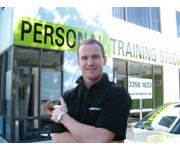How To Become A Personal Training Spokeperson
by Paul Timms (International Fitness Presenter)
 HOW TO BECOME A PERSONAL TRAINING SPOKESPERSON
HOW TO BECOME A PERSONAL TRAINING SPOKESPERSON
One of the best ways to build your personal training business is by taking advantage of any opportunity to speak with the media. While many trainers put in the work hard to attract media attention, many seem to become self conscious and start to stumble over words when put on the spot. For most, television interviews or live radio interviews are the most daunting (do I really sound like that?). The number one rule is try to be yourself, as you will come across more natural.
Bear in mind that the journalist or interviewer is so used to carrying out interviews with various talent, that they will often forget about how nervous you are feeling. Time is of the essence for all journalists, so don't take it personally if they don't have time to make small talk. It's up to you to be fully prepared by the time the interview takes place, and if you aren't, don't go through with the interview.
The fact that you're every word is being recorded is off putting to say the least, but there are a number of measures you can take to ensure the exercise is made that little bit easier to cope with.
Step 1: Be prepared and know what you're talking about.
Step 2: Record your own voice and start getting used to hearing it.
Step 3: Conduct some "mock" or practice interviews to get used to the process of the interview.
The aim of all interviews is just to have an open and honest discussion with one another. As hard as it may be, try to forget that it's a media interview and just speak as if you were talking to a friend or colleague.
Now you are ready to go, so it is all about taking advantage of the next chance that you have to speak with the media with confidence. Here are some tips to help you succeed at the critical moment:
If time permits, try and strike up conversation with the interviewer before the interview commences, it will make you feel more comfortable.
Use short, punchy answers that get your message across and avoid the waffle.
Television Tips
Take the time to make sure you're looking presentable before appearing on camera.
Stand still and don't fidget when involved in a TV interview as it will distract from what you're saying.
Radio Tips
No-one can see what you're doing when you're being interviewed on the radio, so if having your notes in front of you makes you feel more comfortable, then do so.
Don't speak too close to the mouth piece of the phone if it's a phone interview, as your voice can start to crackle.
If you're speaking in a studio on a microphone, don't speak too close to it as your voice may "pop".
Print Tips
With print interviews you can have your notes in front of you as well.
Try and be descriptive in what you're saying, as newspapers don't have the benefit of moving pictures or sound ¡V the words not only need to tell the story, but they need to create distinctive images in peoples minds when they're reading it.
For extra advice and support of an experienced Personal Trainer, contact the Australian Institute of Personal Trainers on 1300 13 84 34.
This article was created by Paul Timms.
|
|
|









 HOW TO BECOME A PERSONAL TRAINING SPOKESPERSON
HOW TO BECOME A PERSONAL TRAINING SPOKESPERSON